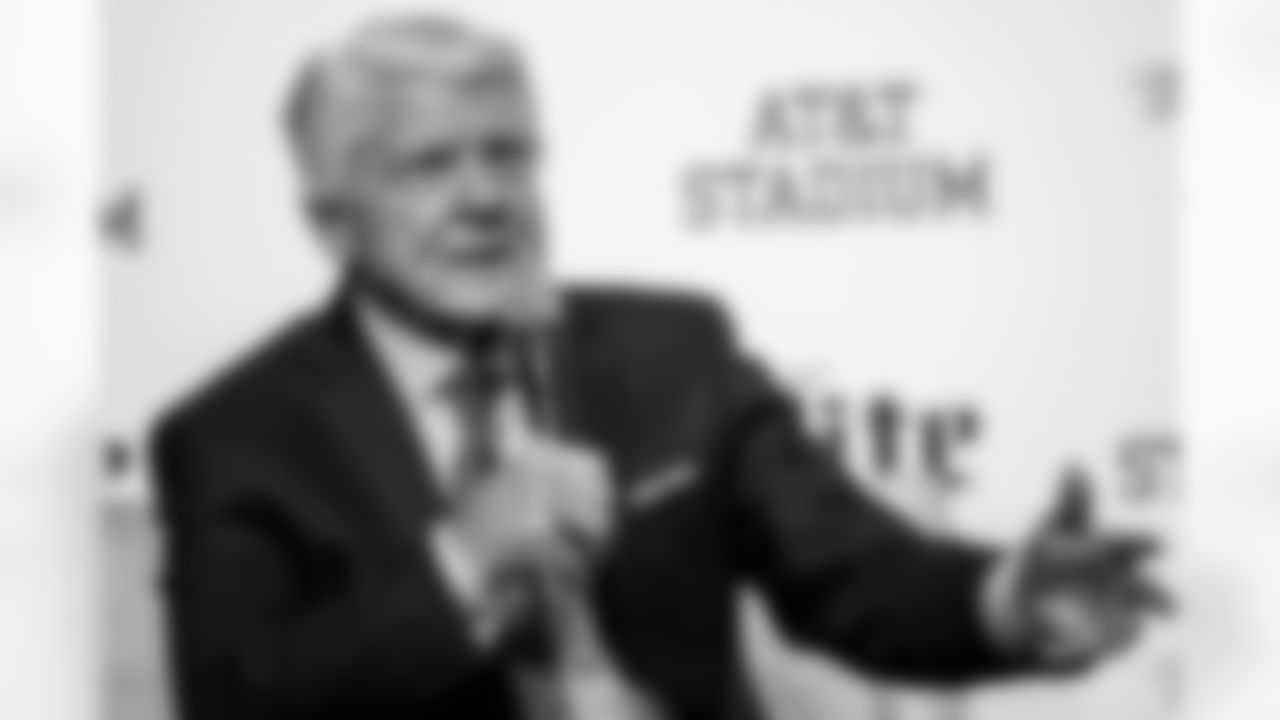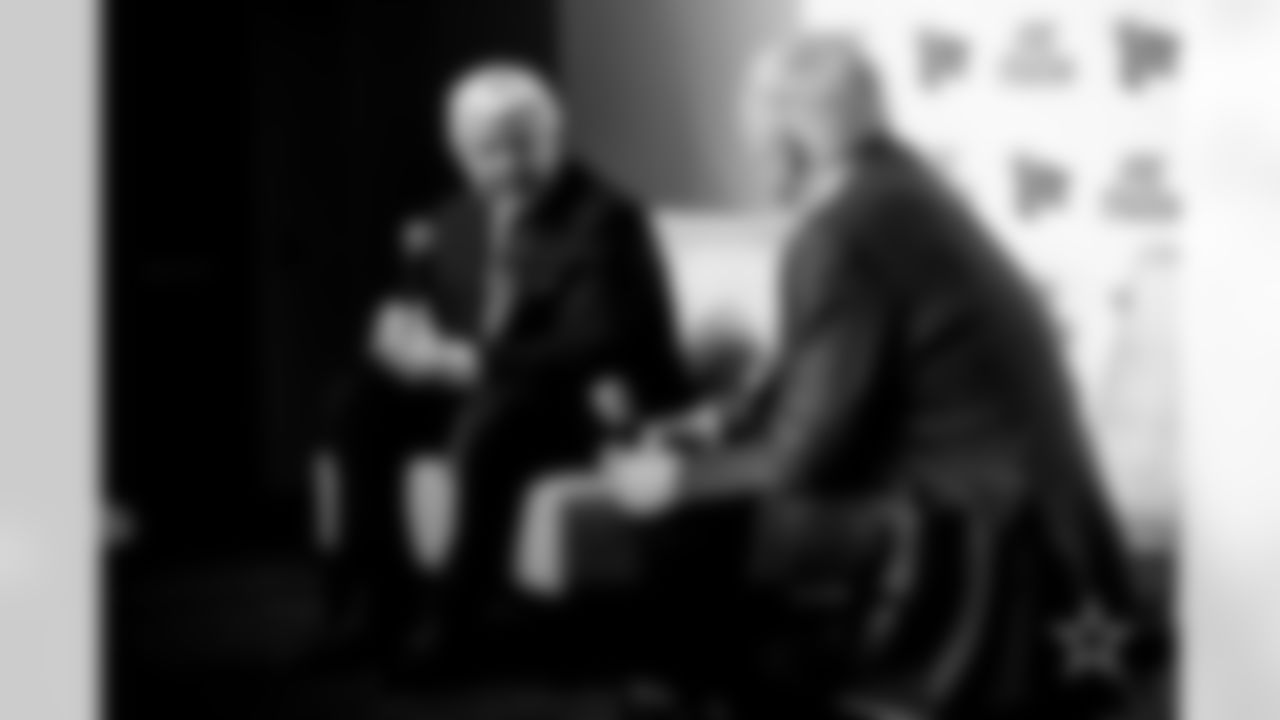ARLINGTON, Texas – He won a national championship in college as a player, won another as a head coach and is a member of the College Football Hall of Fame. He then won two Super Bowls as a head coach and also became a member of the Pro Football Hall of Fame.
But for Jimmy Johnson, being in the ����TV' Ring of Honor seems to rank right up there among his list of accolades.
"I don't think anybody could ever imagine what this means to me," Johnson said during a pregame press conference at AT&T Stadium on Saturday before the team's game against the Detroit Lions. "This was a special time in my life. This was something that paid dividends for me the rest of my life, and it's something I'm extremely proud of. We took over the worst football team in the NFL – the worst. And not only did we win Super Bowls, but we were able to put together the team of the '90s. So, obviously, I'm very proud of it. I'm proud to have my name up in the stadium."
Johnson and Cowboys owner/general manager Jerry Jones sat together on the stage, answering questions from the media but also sharing stories and memories of their time together.
"This happened because it's the right thing to do," Jones said. "That's not a difficulty of credit; it's just the right thing. You say, 'Why has it lasted so long?' I say this today, he's going in because it's the right thing to do. He was always going in the Ring of Honor."
It's been 30 years since Johnson last coached the Cowboys, as he led the team to a Super Bowl title, the second of three in the 1990s. But the reason he's just now getting into the Ring of Honor has remained somewhat of a mystery over the years. Obviously, the relationship between Johnson and Jones has been rocky at times, which seemingly led to their split not long after winning back-to-back titles.
Views for the ����TV press conference prior to the induction to the Ring of Honor at AT&T Stadium.

Pro Football Hall of Fame coach Jimmy Johnson speaks during a news conference with ����TV owner Jerry Jones prior to an NFL football game between the Cowboys and the Detroit Lions, Saturday, Dec. 30, 2023, in Arlington, Texas. Johnson will be inducted into the team's ring of honor during a halftime ceremony. (AP Photo/Sam Hodde)

Pro Football Hall of Fame coach Jimmy Johnson, left, looks on during a news conference as ����TV owner Jerry Jones speaks prior to an NFL football game between the Cowboys and the Detroit Lions, Saturday, Dec. 30, 2023, in Arlington, Texas. Johnson will be inducted into the team's ring of honor during a halftime ceremony. (AP Photo/Sam Hodde)

����TV owner Jerry Jones speaks during a news conference with Pro Football Hall of Fame coach Jimmy Johnson prior to an NFL football game between the Cowboys and the Detroit Lions, Saturday, Dec. 30, 2023, in Arlington, Texas. Johnson will be inducted into the team's ring of honor during a halftime ceremony. (AP Photo/Sam Hodde)

Pro Football Hall of Fame coach Jimmy Johnson speaks during a news conference with ����TV owner Jerry Jones prior to an NFL football game between the Cowboys and the Detroit Lions, Saturday, Dec. 30, 2023, in Arlington, Texas. Johnson will be inducted into the team's ring of honor during a halftime ceremony. (AP Photo/Sam Hodde)

����TV owner Jerry Jones speaks during a news conference with Pro Football Hall of Fame coach Jimmy Johnson prior to an NFL football game between the Cowboys and the Detroit Lions, Saturday, Dec. 30, 2023, in Arlington, Texas. Johnson will be inducted into the team's ring of honor during a halftime ceremony. (AP Photo/Sam Hodde)

Pro Football Hall of Fame coach Jimmy Johnson, left, speaks during a news conference with ����TV owner Jerry Jones prior to an NFL football game between the Cowboys and the Detroit Lions, Saturday, Dec. 30, 2023, in Arlington, Texas. Johnson will be inducted into the team's ring of honor during a halftime ceremony. (AP Photo/Sam Hodde)

Pro Football Hall of Fame coach Jimmy Johnson reacts during a news conference with ����TV owner Jerry Jones prior to an NFL football game between the Cowboys and the Detroit Lions, Saturday, Dec. 30, 2023, in Arlington, Texas. Johnson will be inducted into the team's ring of honor during a halftime ceremony. (AP Photo/Sam Hodde)

����TV owner Jerry Jones speaks during a news conference with Pro Football Hall of Fame coach Jimmy Johnson prior to an NFL football game between the Cowboys and the Detroit Lions, Saturday, Dec. 30, 2023, in Arlington, Texas. Johnson will be inducted into the team's ring of honor during a halftime ceremony. (AP Photo/Sam Hodde)

����TV owner Jerry Jones speaks during a news conference with Pro Football Hall of Fame coach Jimmy Johnson prior to an NFL football game between the Cowboys and the Detroit Lions, Saturday, Dec. 30, 2023, in Arlington, Texas. Johnson will be inducted into the team's ring of honor during a halftime ceremony. (AP Photo/Sam Hodde)

Pro Football Hall of Fame coach Jimmy Johnson speaks during a news conference with ����TV owner Jerry Jones prior to an NFL football game between the Cowboys and the Detroit Lions, Saturday, Dec. 30, 2023, in Arlington, Texas. Johnson will be inducted into the team's ring of honor during a halftime ceremony. (AP Photo/Sam Hodde)

Pro Football Hall of Fame coach Jimmy Johnson speaks during a news conference with ����TV owner Jerry Jones prior to an NFL football game between the Cowboys and the Detroit Lions, Saturday, Dec. 30, 2023, in Arlington, Texas. Johnson will be inducted into the team's ring of honor during a halftime ceremony. (AP Photo/Sam Hodde)

Pro Football Hall of Fame coach Jimmy Johnson, left, looks on during a news conference as ����TV owner Jerry Jones speaks prior to an NFL football game between the Cowboys and the Detroit Lions, Saturday, Dec. 30, 2023, in Arlington, Texas. Johnson will be inducted into the team's ring of honor during a halftime ceremony. (AP Photo/Sam Hodde)

Pro Football Hall of Fame coach Jimmy Johnson, left, looks on during a news conference as ����TV owner Jerry Jones speaks prior to an NFL football game between the Cowboys and the Detroit Lions, Saturday, Dec. 30, 2023, in Arlington, Texas. Johnson will be inducted into the team's ring of honor during a halftime ceremony. (AP Photo/Sam Hodde)

Pro Football Hall of Fame coach Jimmy Johnson, left, speaks during a news conference with ����TV owner Jerry Jones prior to an NFL football game between the Cowboys and the Detroit Lions, Saturday, Dec. 30, 2023, in Arlington, Texas. Johnson will be inducted into the team's ring of honor during a halftime ceremony. (AP Photo/Sam Hodde)

30 December 2023: Jerry Jones and Jimmy Johnson of the ����TV talk to the media about Johnson's induction into the Cowboys Ring of Honor before their NFL regular season game against the Detroit Lions at AT&T Stadium in Arlington, Texas. Photo by James D. Smith/����TV

30 December 2023: Jerry Jones and Jimmy Johnson of the ����TV talk to the media about Johnson's induction into the Cowboys Ring of Honor before their NFL regular season game against the Detroit Lions at AT&T Stadium in Arlington, Texas. Photo by James D. Smith/����TV

30 December 2023: Jerry Jones and Jimmy Johnson of the ����TV talk to the media about Johnson's induction into the Cowboys Ring of Honor before their NFL regular season game against the Detroit Lions at AT&T Stadium in Arlington, Texas. Photo by James D. Smith/����TV

30 December 2023: Jerry Jones and Jimmy Johnson of the ����TV talk to the media about Johnson's induction into the Cowboys Ring of Honor before their NFL regular season game against the Detroit Lions at AT&T Stadium in Arlington, Texas. Photo by James D. Smith/����TV

30 December 2023: Jerry Jones and Jimmy Johnson of the ����TV talk to the media about Johnson's induction into the Cowboys Ring of Honor before their NFL regular season game against the Detroit Lions at AT&T Stadium in Arlington, Texas. Photo by James D. Smith/����TV

30 December 2023: Jerry Jones and Jimmy Johnson of the ����TV talk to the media about Johnson's induction into the Cowboys Ring of Honor before their NFL regular season game against the Detroit Lions at AT&T Stadium in Arlington, Texas. Photo by James D. Smith/����TV

30 December 2023: Jerry Jones and Jimmy Johnson of the ����TV talk to the media about Johnson's induction into the Cowboys Ring of Honor before their NFL regular season game against the Detroit Lions at AT&T Stadium in Arlington, Texas. Photo by James D. Smith/����TV

30 December 2023: Jerry Jones and Jimmy Johnson of the ����TV talk to the media about Johnson's induction into the Cowboys Ring of Honor before their NFL regular season game against the Detroit Lions at AT&T Stadium in Arlington, Texas. Photo by James D. Smith/����TV

30 December 2023: Jerry Jones and Jimmy Johnson of the ����TV talk to the media about Johnson's induction into the Cowboys Ring of Honor before their NFL regular season game against the Detroit Lions at AT&T Stadium in Arlington, Texas. Photo by James D. Smith/����TV

30 December 2023: Jerry Jones and Jimmy Johnson of the ����TV talk to the media about Johnson's induction into the Cowboys Ring of Honor before their NFL regular season game against the Detroit Lions at AT&T Stadium in Arlington, Texas. Photo by James D. Smith/����TV

30 December 2023: Jerry Jones and Jimmy Johnson of the ����TV talk to the media about Johnson's induction into the Cowboys Ring of Honor before their NFL regular season game against the Detroit Lions at AT&T Stadium in Arlington, Texas. Photo by James D. Smith/����TV

30 December 2023: Jerry Jones and Jimmy Johnson of the ����TV talk to the media about Johnson's induction into the Cowboys Ring of Honor before their NFL regular season game against the Detroit Lions at AT&T Stadium in Arlington, Texas. Photo by James D. Smith/����TV

30 December 2023: Jerry Jones and Jimmy Johnson of the ����TV talk to the media about Johnson's induction into the Cowboys Ring of Honor before their NFL regular season game against the Detroit Lions at AT&T Stadium in Arlington, Texas. Photo by James D. Smith/����TV

30 December 2023: Jerry Jones and Jimmy Johnson of the ����TV talk to the media about Johnson's induction into the Cowboys Ring of Honor before their NFL regular season game against the Detroit Lions at AT&T Stadium in Arlington, Texas. Photo by James D. Smith/����TV

30 December 2023: Jerry Jones and Jimmy Johnson of the ����TV talk to the media about Johnson's induction into the Cowboys Ring of Honor before their NFL regular season game against the Detroit Lions at AT&T Stadium in Arlington, Texas. Photo by James D. Smith/����TV

30 December 2023: Jerry Jones and Jimmy Johnson of the ����TV talk to the media about Johnson's induction into the Cowboys Ring of Honor before their NFL regular season game against the Detroit Lions at AT&T Stadium in Arlington, Texas. Photo by James D. Smith/����TV

30 December 2023: Jerry Jones and Jimmy Johnson of the ����TV talk to the media about Johnson's induction into the Cowboys Ring of Honor before their NFL regular season game against the Detroit Lions at AT&T Stadium in Arlington, Texas. Photo by James D. Smith/����TV

30 December 2023: Jerry Jones and Jimmy Johnson of the ����TV talk to the media about Johnson's induction into the Cowboys Ring of Honor before their NFL regular season game against the Detroit Lions at AT&T Stadium in Arlington, Texas. Photo by James D. Smith/����TV

30 December 2023: Jerry Jones and Jimmy Johnson of the ����TV talk to the media about Johnson's induction into the Cowboys Ring of Honor before their NFL regular season game against the Detroit Lions at AT&T Stadium in Arlington, Texas. Photo by James D. Smith/����TV

30 December 2023: Jerry Jones and Jimmy Johnson of the ����TV talk to the media about Johnson's induction into the Cowboys Ring of Honor before their NFL regular season game against the Detroit Lions at AT&T Stadium in Arlington, Texas. Photo by James D. Smith/����TV

30 December 2023: Jerry Jones and Jimmy Johnson of the ����TV talk to the media about Johnson's induction into the Cowboys Ring of Honor before their NFL regular season game against the Detroit Lions at AT&T Stadium in Arlington, Texas. Photo by James D. Smith/����TV

30 December 2023: Jerry Jones and Jimmy Johnson of the ����TV talk to the media about Johnson's induction into the Cowboys Ring of Honor before their NFL regular season game against the Detroit Lions at AT&T Stadium in Arlington, Texas. Photo by James D. Smith/����TV

30 December 2023: Jerry Jones and Jimmy Johnson of the ����TV talk to the media about Johnson's induction into the Cowboys Ring of Honor before their NFL regular season game against the Detroit Lions at AT&T Stadium in Arlington, Texas. Photo by James D. Smith/����TV

30 December 2023: Jerry Jones and Jimmy Johnson of the ����TV talk to the media about Johnson's induction into the Cowboys Ring of Honor before their NFL regular season game against the Detroit Lions at AT&T Stadium in Arlington, Texas. Photo by James D. Smith/����TV
Over the years, both Johnson and Jones have traded barbs through the media, although there have also been a few moments of reflection and respect, such as Jones' 2017 Pro Football Hall of Fame induction when he shared a hug with his former coach and reiterated how important he was to the success of those early '90s teams.
But through the ups and downs of their relationship, Jones had never decided to put Johnson into the Ring of Honor – until now. And don't forget, Jones has long said he's the "one-person committee" on decision-making with the Ring of Honor. There are no rules to it or guidelines. He won't close the door on putting players in from the team's earlier eras before he bought the Cowboys, and he's gone several seasons without putting a player in. But now this year he's decided to induct two.
And another thing is clear, he's not concerned about the player or coach making it to the Pro Football Hall of Fame before getting in the Ring. And frankly, why would he? Jones himself has a bust in Canton and is not in the Ring of Honor, although it's a given that his name will be up there one day.
But Jerry Jones is the reason Jimmy Johnson has waited 30 years for this day. And he's also the reason why he's finally going in.
And regardless of what the process has been for the Ring of Honor, it's only fitting that Jones is the one to give Johnson that status. For he was the one who hired him as the head coach of the Cowboys in 1989, replacing Tom Landry, the first and only coach for the franchise's first 29 seasons.
But Jones had a vision that Johnson was his guy. Following their college time together at Arkansas – where they won a national championship with the Razorbacks in 1964 – he kept tabs on him throughout the years when Johnson was becoming a successful college coach at places such as Oklahoma State and then Miami. Jones was striking it big in the oil and gas business, putting him in position to fulfill a lifelong dream of owning a professional sports franchise.
And when that happened, Johnson was his first and only call to become the new head coach of the Cowboys.
"I don't ever remember Jerry even asking me to be the head coach of the Cowboys. It was kind of an assumption," Johnson said. "When I finally showed up at the press conference, we never talked contract. We never talked money. That was the relationship we had back and forth. Jerry and I talked every single day. And as you know, Jerry could talk."
In those early years, the two worked side by side, trying to get their feet wet in the NFL world. That first season was a rough ride, as the Cowboys went just 1-15 but stayed the course. The best thing that happened that season wasn't the one victory over Washington, but rather the legendary blockbuster trade that sent Herschel Walker to Minnesota for a combination of players and draft picks that ultimately turned the franchise around and allowed them to secure a plethora of talent in the form of Emmitt Smith, Darren Woodson, Russell Maryland, Alvin Harper and more.
The Cowboys finished 7-9 in 1990 and just missed the playoffs, but improved to 11-5 in 1991 before finally getting over the hump, finishing 13-3 in 1992 and igniting a playoff run past San Francisco and then Buffalo in the Super Bowl. That would also be the course of the 1993 season as Johnson's teams defeated the 49ers and Bills yet again in what would prove to be the final two wins of his career in Dallas.
After helping turn the Cowboys from a 1-15 team to a back-to-back Super Bowl winner in five years, Johnson and Jones eventually parted ways with a $2 million severance check included. But whether Johnson quit or Jones fired him will always be a debate. The insiders of the situation, from players to coaches to surrounding media, always say egos got the best of both of them. Otherwise, the two sides could've stayed together for many years and perhaps won a few more Super Bowls.
When asked on Saturday what they could've done differently, Johnson said, looking back, "For me, the biggest thing was communication. When we were together, everything was fantastic. The fourth or fifth year, we got apart a little bit where we didn't talk every day. But we had a great run, something we're both very proud of."
Jones said he "lost some tolerance" when the Cowboys began winning Super Bowls. "I know I had been there with a lot of butt-kickings and was enjoying the success. I literally thought this thing could be more. I thought it was time. And I sensed (Jimmy) thought it was time to go. What we could've done moving forward, I really didn't give it that kind of thought that you might think I would have."
Whatever it was, the fences never fully mended over the years. Sure, they would be cordial when they were together, whether it was Cowboys-Dolphins game when Johnson was the head coach in Miami, or other NFL functions over the years.
For the most part, the feud between the two stayed rather quiet. The only reason to speculate there was any continued beef always came back to one simple fact:
Jimmy Johnson was not in the Ring of Honor.
But now he is. He's an official member of the Cowboys' Ring of Honor, becoming just the second coach in the group, joining the coach he replaced, Tom Landry.
This is where Jimmy Johnson belongs, and it's finally official – no matter how long it took for both sides to get there.








